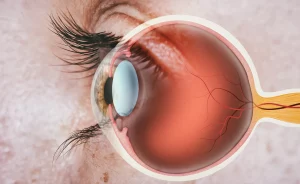Introduction
Poor sleep has long been associated with various health issues, but recent research suggests a potential link between inadequate sleep and vision impairment. This article delves into the intricate relationship between sleep quality and eye health, shedding light on how neglecting your rest may impact your vision. Want To Explore More About (Common Risky Health Conditions)
Understanding the Link
Recent studies have indicated a correlation between sleep disorders and eye conditions. Notably, conditions like glaucoma and age-related macular degeneration (AMD) have been observed to worsen with poor sleep patterns. Moreover, inadequate sleep may exacerbate symptoms of dry eye syndrome and contribute to ocular inflammation.
The Role of Melatonin
Melatonin, often referred to as the “sleep hormone,” plays a crucial role in regulating sleep-wake cycles. Beyond its sleep-inducing properties, melatonin exhibits antioxidant effects, protecting the eyes from oxidative stress. Disrupted sleep patterns can hinder melatonin production, potentially leaving the eyes vulnerable to oxidative damage.
Impact on Retinal Health
The retina, essential for vision, is highly sensitive to oxidative stress. Prolonged exposure to oxidative damage can accelerate retinal degeneration, leading to vision impairment and, in severe cases, blindness. Adequate sleep, by promoting melatonin production, helps mitigate oxidative stress and preserves retinal integrity.

Addressing Sleep Disorders
Recognizing the significance of sleep in maintaining optimal eye health underscores the importance of addressing sleep disorders promptly. Effective management strategies, including lifestyle modifications, sleep hygiene practices, and, if necessary, medical interventions, can alleviate sleep disturbances and safeguard vision.
Lifestyle Modifications
Simple lifestyle changes, such as establishing a consistent sleep schedule, limiting screen time before bed, and creating a relaxing bedtime routine, can significantly improve sleep quality. Additionally, regular exercise and healthy dietary habits contribute to overall well-being, indirectly benefiting both sleep and eye health.
Sleep Hygiene Practices
Practicing good sleep hygiene involves cultivating habits conducive to restful sleep. This encompasses optimizing your sleep environment by ensuring comfortable bedding, eliminating noise, and maintaining ideal room temperature. Furthermore, avoiding stimulants like caffeine and alcohol close to bedtime promotes uninterrupted sleep.
Medical Interventions
In cases where lifestyle modifications prove insufficient, seeking medical assistance is paramount. Healthcare professionals may recommend behavioral therapy, prescription medications, or alternative therapies to address underlying sleep disorders effectively. Timely intervention can prevent further deterioration of both sleep quality and ocular health.

Effects of Sleep Quality on Eye Health
| Aspect | Impact of Adequate Sleep | Impact of Poor Sleep |
|---|---|---|
| Melatonin Production | Promotes production, aiding in antioxidant defense mechanisms. | Inhibits production, leaving eyes susceptible to oxidative stress. |
| Retinal Integrity | Preserves retinal health and function. | Puts retinal integrity at risk, accelerating degeneration. |
| Vision | Supports optimal vision performance. | Contributes to vision impairment and potential blindness. |
Conclusion
In conclusion, the intricate interplay between sleep and eye health highlights the significance of prioritizing adequate rest. Neglecting sleep not only compromises overall well-being but also poses a risk to vision, potentially leading to blindness. By understanding the implications of poor sleep on ocular health and adopting proactive measures to improve sleep quality, individuals can safeguard their vision and promote long-term eye health.












